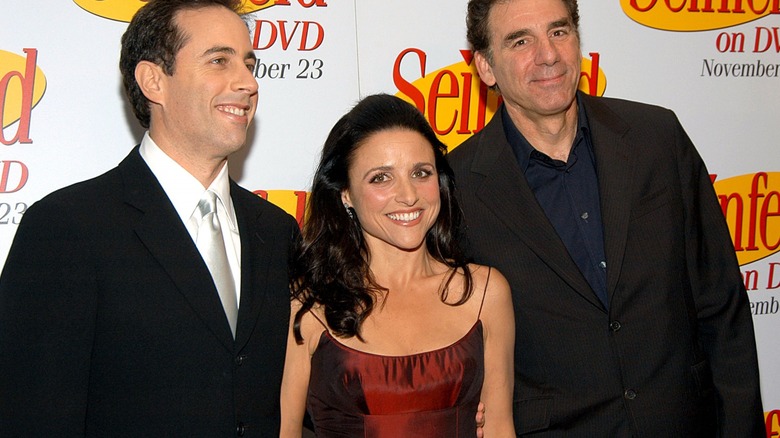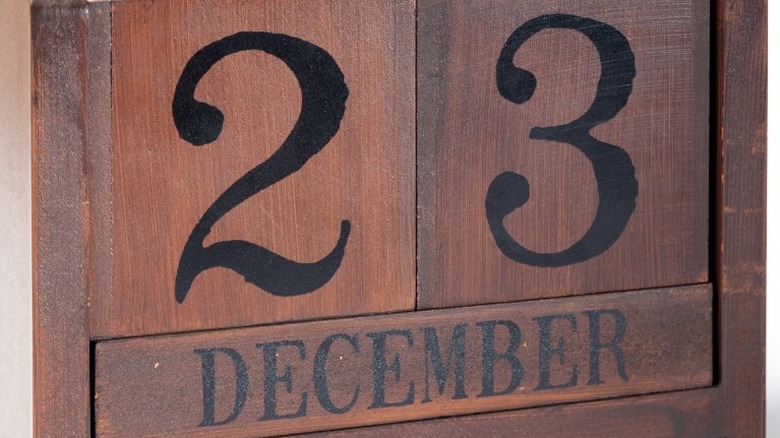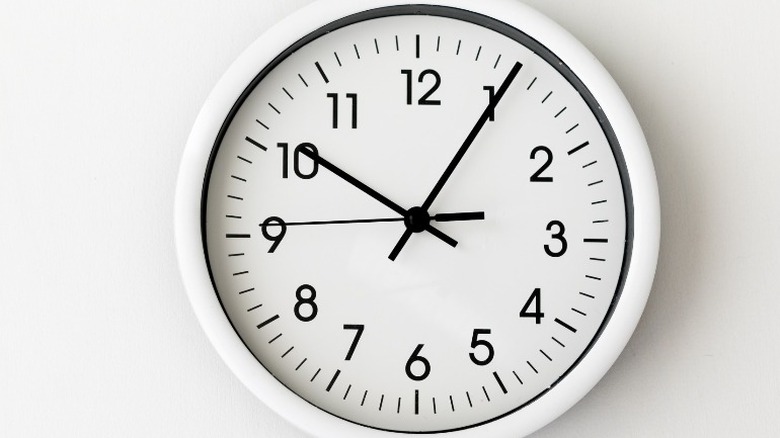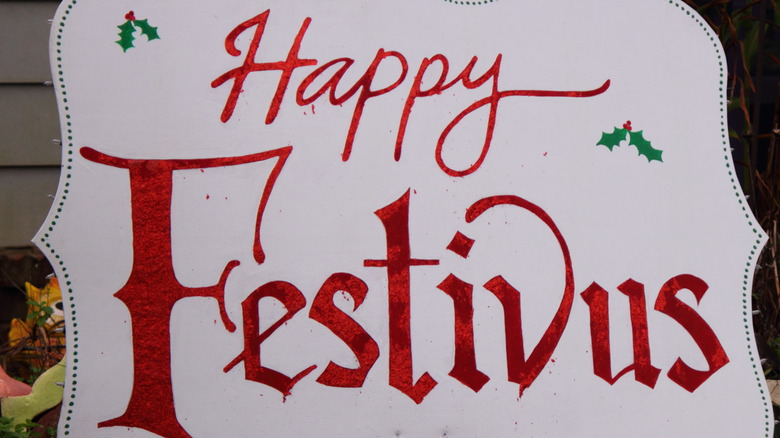The True Origin Of Festivus Holiday From Seinfeld
Debating anyone in the vast "Seinfeld" fandom about which episode is the greatest will make you hear well-thought-out arguments, with some citing the merits of the gang's battle with avoiding the evils of self-pleasure in "The Contest" or hoisting up the cantankerous attitude of a verbally abusive restauranter in "The Soup Nazi."
The nine-season run of "Seinfeld" introduced fans to a host of zany characters that had as many quotable lines as they did relatable awkward situations. But in the near 200 episode run of the show, "Seinfeld" never had an episode that specifically centered around a holiday. No touching Christmas moments or Halloween pranks were present during any of the 22 minutes peeks into the lives of who might be the most shallow and self-centered people on the planet. The one episode that does center around a holiday is a fictional celebration.
"Festivus" was the holiday that supporting character George Costanza had to suffer through every year of his childhood after his father, Frank, created it out of protest against the materialism of the traditional holiday season. What "Seinfeld" fans might not know is that the Festivus celebrated by the Costanza family on the show is based on a fictional holiday that was created by Daniel O'Keefe, Sr., the father of the same Dan O'Keefe that wrote the episode "The Strike" in which the holiday is celebrated, according to the Daily Beast.
How Festivus began according to Frank Costanza
Several scenes into the episode "The Strike" finds George, Elaine, and Jerry at Monk's coffee shop. While George is opening his mail he becomes noticeably agitated while reading a holiday card. Seizing the card from him, Elaine reads the words "Dear son, Happy Festivus." Using this card as a device to explain Festivus to the viewer, Jerry outlines to an amused Elaine (much to the frustration of George) what Festivus is and how it all got started.
What the "Seinfeld" episode yields eventually is a holiday long ago created by George's father, Frank. During the episode Frank is found discussing how Festivus began, explaining that a fistfight between him and another man over the last doll available in a toy store made Frank look at the holiday season through a different lens. In Frank's own words, "As I rained blows upon him, I realized there had to be another way." He continues "Out of that, a new holiday was born. A Festivus for the rest of us!" giving fans one of the more memorable lines that are echoed annually.
Celebrated on the show on December 23rd, Festivus had traditions and events that were all concocted by Frank. He explains that there is no tree (he finds tinsel to be distracting) and instead celebrates with an aluminum pole. Over dinner, Frank has the annual "airing of grievances" in which he highlights how everyone has disappointed him throughout the year. Finally, the endcap for the holiday is the "Feats of Strength," in which someone has to fight him.
The real life Festivus had a clock in a bag
"Seinfeld" writer Dan O'Keefe, who penned "The Strike" episode, came from a family of writers. His father, Dan Sr., was an editor for Reader's Digest. Dan credits his father's own Festivus holiday for the inspiration behind the one celebrated on the show (per the New York Post). To give some background on his father's character and how it might have fit into the creation of Festivus, the "Seinfeld" writer explains some pretty serious issues his father struggled with. In an interview with the Daily Beast podcast "Fever Dreams, he states "I mean this in the nicest way possible: My father was an undiagnosed bipolar, severe alcoholic who nonetheless was extremely high-functioning."
Unlike the holiday celebrated on the show, the real-life Festivus didn't have a set date for its celebration. As the junior O'Keefe puts it "In real life, it could just happen whenever the f*** he felt like it." He explains that in one year there were two different Festivus celebrations, while another year had none at all.
The childhood home of O'Keefe didn't have an aluminum pole during the celebration. Rather, his father would drive a nail into the wall. He would then put a clock into a bag and hang it on the nail. Still baffled in adulthood as to why this was the symbol his father chose for a made-up holiday; he states that there also "was a poem that referred to 'clock and bag'. And it was rhymed—four-line stanzas with a very complicated rhyme scheme."
There was no "Feats of Strength" in the real Festivus
While George was forced to wrestle with his father after the annual Festivus dinner on the show, the real-life Festivus did not have this tradition. But this omission didn't mean that the real Festivus wasn't as traumatic for O'Keefe and his two brothers.
The "Airing of Grievances" was certainly a real part of the Festivus that the O'Keefe's celebrated. The "Seinfeld" writer describes it to the Daily Beast as "a very formalized setting for yelling at us," comparing the drunken rants of his father to being in line with the definition of abuse. Their father would continue to rant about "the politics of the Reader's Digest C-suite" and other workplace issues he was frustrated with. The younger O'Keefe also recalls how his father would make his younger, crying brother sing songs in German.
They didn't dare ask about the significance of the clock in the bag, either. Doing so, according to O'Keefe, would only result in the senior O'Keefe screaming at them about how they didn't need to know.
The writer managed to bury the trauma associated with Festivus when he left home, putting the entire holiday out of his mind. But one night at a party with his younger brother spawned a meeting that would culminate in one of the most hilarious episodes of "Seinfeld" ever aired.
Details about Festivus had to be almost coerced out of O'Keefe by head writers on the show
While at a party in LA one evening, O'Keefe was having a conversation with one of his brothers. For reasons undisclosed, the subject of their childhood holiday trauma reared its ugly head. He explains "my loud-mouth younger brother opens his yap and mentions this weird family holiday called Festivus" (per Daily Beast). He recalls that some of his "Seinfeld" colleagues were a part of this conversation and they demanded details. O'Keefe quickly changed the subject, but when word got around to the other writers his fate was sealed.
He describes how some of the writing staff took him to a coffee shop and impressed upon him how Jerry Seinfeld had heard all about Festivus, and he loved the idea of the show having Festivus as a part of an episode. O'Keefe was reluctant at first but decided to pen an episode about Festivus being one of Frank Costanza's many bizarre quirks. And the rest is history.
Festivus has become a holiday of its own
Though only celebrated in real life by the O'Keefe family for years, "Seinfeld" has made Festivus an annual tradition for many fans who follow Frank Costanza's guidelines as laid out in the episode. The New York Post writes about how users on Twitter recounted how they celebrated Festivus over the last holiday season. Many users tweeted how they would put out an aluminum pole, careful not to adorn it with any decorations. Dinners with friends and family are held on December 23rd by show devotees, complete with the traditional Airing of Grievances and followed by the Feats of Strength.
The New York Post also writes about how Festivus sweaters and socks are sold online every year on Amazon. Perhaps if the corporate giants are recognizing the holiday by selling its name to consumers to wear on clothing, then maybe it means that Festivus has come into its own as a real holiday. Undoubtedly, the consumerism around Festivus is despite its anti-materialistic roots, but that's Frank's problem to work through during next Festivus's Airing of Grievances.





